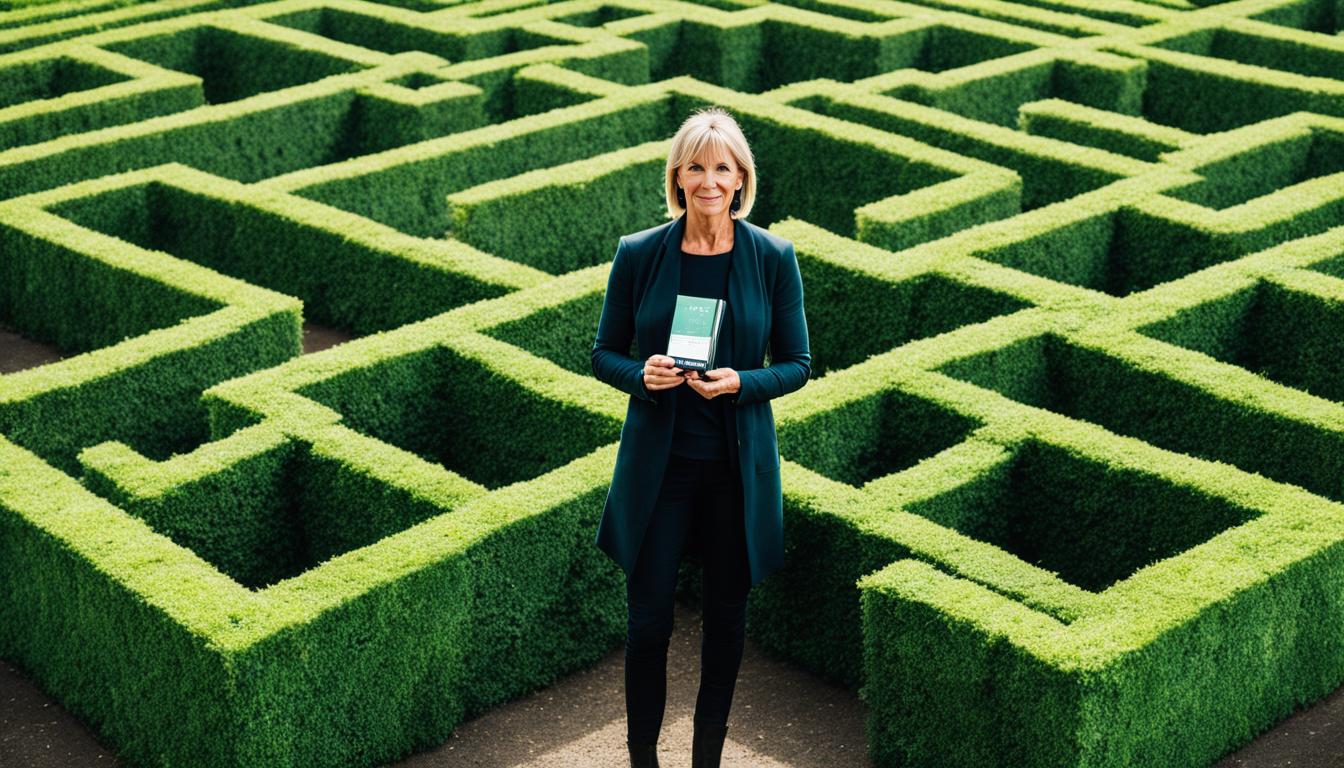If you’re a fan of historical adventure, mystery, and intrigue, then “Labyrinth” by Kate Mosse may be the perfect audiobook for you. In this review, we’ll explore the plot, characters, writing style, historical context, and critical reception of “Labyrinth.” We’ll also discuss the audiobook version and how it enhances the reading experience.
Key Takeaways
- “Labyrinth” by Kate Mosse is a historical adventure filled with mystery and intrigue.
- The audiobook version of “Labyrinth” is a great way to experience the story.
- The book explores deeper themes and messages, making it a thought-provoking read.
- “Labyrinth” has received mixed reviews from critics and readers.
- This review provides a comprehensive analysis of the audiobook version of “Labyrinth.”
Overview of “Labyrinth”
“Labyrinth” is a historical adventure novel by Kate Mosse that is sure to keep readers on the edge of their seats. This gripping tale is filled with mystery and intrigue, making it a must-read for fans of the genre.
The story takes place in both the past and present, following two strong and determined women who are connected through time and the ancient myth of the Holy Grail. Their stories intersect as they unravel the secrets of the Labyrinth, a hidden fortress in the mountains of southwest France.
The historical backdrop of the book adds depth and richness to the narrative, immersing the reader in a world of knights, crusaders, and religious conflict. Mosse’s vivid descriptions transport readers back in time, making the story come alive.
Overall, “Labyrinth” is a thrilling adventure that will captivate readers from beginning to end.
Plot Summary
In “Labyrinth,” Kate Mosse weaves a tale of two women, separated by centuries but connected through their shared fate. The story is set in the Languedoc region of France, where history, mystery, and legend intertwine.
The novel begins in 1209, following the brutal suppression of the Cathar heresy by the Catholic Church. Young Alais, daughter of the guardian of the sacred book that holds the secret of the true Grail, finds herself in possession of a dangerous secret. She must navigate the treacherous political landscape of her time, fighting to protect her family and the people she loves.
In the present day, Alice Tanner, a volunteer on an archaeological dig in the same region, discovers the skeletal remains of a woman in a hidden cave. As Alice unearths the secrets of the past, she finds herself in grave danger. She must race against time to uncover the truth behind the woman’s death before it is too late.
Mosse’s storytelling weaves together the lives of Alais and Alice, bringing their stories to a stunning conclusion. The novel is a thrilling adventure full of twists and turns, as well as a poignant tale of love and sacrifice.
Key Events
| 1209 | Alais discovers the secret of the Grail |
|---|---|
| Present day | Alice finds skeletal remains in a hidden cave |
| 1209 | Alais fights to protect her family and the secret of the Grail |
| Present day | Alice races against time to uncover the truth behind the woman’s death |
Major Characters
- Alais, daughter of the guardian of the sacred book
- Alice Tanner, volunteer on an archaeological dig
- Will, a friend of Alice’s and a radio journalist
- Valentine, a historian and friend of Alice’s
- Guilhem, a troubadour and Alais’s lover
- Carcassonne, the medieval city where much of the novel takes place
Throughout the novel, Mosse masterfully crafts these characters, breathing life into each of their distinct personalities and making them feel real and relatable.
Main Characters
Kate Mosse’s “Labyrinth” follows two female protagonists from different eras: Alice Tanner, a modern-day volunteer archaeologist, and Alais, a young woman from 13th century France. The story also features an intriguing cast of supporting characters, including:
| Name | Role |
|---|---|
| Will Franklin | Alice’s love interest |
| Shelagh Tanner | Alice’s estranged mother |
| Guilhem du Mas | Alais’s protector and friend |
| Frederic, Viscount of Carcassonne | Alais’s employer and eventual romantic interest |
Each character adds depth and complexity to the story, with their own distinct personalities and motivations. Mosse does an excellent job of weaving their individual storylines together to create a rich and compelling narrative.
Historical Context

In “Labyrinth,” Kate Mosse takes readers on a journey through two different time periods: modern-day France and the thirteenth century. The book explores the medieval Cathar movement, which was a Christian sect that was deemed heretical by the Catholic Church. The historical context of the novel is integral to the plot, as it serves as the backdrop for the story’s religious and political conflicts.
The Cathars believed in dualism, which meant that they believed in two deities: one good and one evil. They also rejected the Catholic Church’s teachings on the sacraments and the priesthood. As a result, they were relentlessly persecuted by the Church, and many were brutally murdered during the Albigensian Crusade of the early thirteenth century.
The novel’s setting in Carcassonne, France is also significant, as the city played a crucial role in the Cathar movement. The city’s strategic location near the French-Spanish border made it a hub for regional power struggles, and it eventually became a site of conflict during the crusade.
Through her vivid descriptions of the time period and setting, Mosse transports readers to a world long gone, but whose influence is still felt today. The historical context of “Labyrinth” adds depth and richness to the story, making it a compelling read for history buffs and fiction fans alike.
Writing Style
In “Labyrinth,” Kate Mosse showcases her masterful writing style and storytelling techniques. With flowing prose and vivid descriptions, Mosse immerses readers in the world of medieval France, bringing to life both the time and place in which the story is set. Her writing style combines historical accuracy with a strong sense of narrative momentum, keeping readers engaged from beginning to end.
Mosse employs a variety of literary devices to create tension and intrigue, such as foreshadowing and dramatic irony. One effective technique she uses is the alternating point of view between her two main characters, allowing readers to gain insight into both sides of the story. This adds depth and complexity to the plot, as readers are kept guessing as to how events will ultimately unfold.
The audiobook version of “Labyrinth” enhances Mosse’s already impressive writing style, with a captivating narration by Donada Peters. Peters’ voice perfectly captures the mood and atmosphere of the story, immersing listeners in the world of medieval France. The combination of Mosse’s writing and Peters’ narration make for a truly compelling listening experience.
Examples of Literary Devices Used in “Labyrinth”
| Literary Device | Description | Example from “Labyrinth” |
|---|---|---|
| Foreshadowing | The use of hints or clues to suggest what will happen later in the story. | “Everything about her was wrong – her clothes, her hair, the graze on her cheek…but it was something else, something intangible, that made Pete’s breath catch in his throat.” |
| Dramatic Irony | When the audience knows more than the character(s) in the story | “Alice’s heart raced as she reached for the door, completely unaware of the figure lurking outside.” |
| Point of View | The perspective from which the story is told. | “Alaïs could see Gui’s anger mounting, but he spoke calmly, his voice barely above a whisper.” |
Audiobook Experience

If you’re a fan of audiobooks, you won’t be disappointed with the version of “Labyrinth” by Kate Mosse. The narrator’s performance is top-notch, bringing the characters and story to life with depth and emotion. The overall production quality is excellent, with clear and consistent audio quality throughout the entire book.
The audiobook enhances the storytelling experience, adding an extra layer of immersion to the already captivating plot. Listening to “Labyrinth” in audiobook format allows you to fully immerse yourself in the historical adventure, making it a perfect choice for long commutes or relaxing evenings at home.
Themes and Messages
In “Labyrinth,” Kate Mosse weaves together a thrilling tale of adventure and intrigue that touches upon several key themes and messages relevant to readers today. One of the most prominent themes is the power of family and loyalty, as the main character, Alice, learns to navigate complex relationships and make difficult decisions in the face of danger. Another important theme is the struggle for power between men and women, as Alice and other female characters fight against entrenched institutions and societal norms to claim their own agency and independence.
The book also explores the concept of fate and destiny, as Alice uncovers hidden clues and discovers her own role in an ancient web of secrets and prophecies. This theme is particularly relevant to readers who are interested in history and mythology, as Mosse draws upon real-world legends and artifacts to create a rich and immersive world.
Mosse’s writing is infused with a sense of mystery and wonder that keeps readers engaged and guessing until the very end. Her use of symbolism and foreshadowing is particularly effective, lending an atmospheric and ominous tone to the narrative.
Overall, “Labyrinth” is a complex and thought-provoking work that explores a wide range of human experiences and emotions. Its themes and messages are sure to resonate with readers of all backgrounds, making it a must-read for anyone interested in historical adventure and mystery.
Pacing and Suspense
One of the strongest aspects of “Labyrinth” is its expert pacing and suspenseful storytelling. Kate Mosse keeps readers on the edge of their seats throughout the book, with each new twist and turn driving the plot forward. The tension builds steadily, culminating in a thrilling conclusion that will leave readers breathless.
The audiobook version of “Labyrinth” only enhances this gripping experience, drawing listeners in with its excellent narration and perfectly timed pacing. The suspenseful moments are even more impactful when heard aloud, immersing listeners in the world of the story and keeping them engaged until the very end.
Comparison to Other Works by Kate Mosse
As one of Kate Mosse’s most well-known works, “Labyrinth” has been hailed for its gripping plot and strong character development. But how does it compare to other books in Mosse’s literary catalog?
One of Mosse’s other popular novels is “Sepulchre,” which explores similar themes of mystery and the supernatural in a historical setting. However, “Labyrinth” stands out for its intricate plot and well-defined characters.
Another notable work by Mosse is “The Burning Chambers,” a historical epic set during the religious wars of 16th-century France. While it shares some similarities with “Labyrinth” in terms of setting and historical context, “The Burning Chambers” is a much larger-scale story with a wider range of characters.
Overall, “Labyrinth” showcases Mosse’s talent for weaving complex narratives that keep readers on the edge of their seats. While it shares similarities with some of her other works, it manages to stand out on its own as a thrilling historical adventure.
Critical Reception
The audiobook version of “Labyrinth” by Kate Mosse has received mixed reviews from critics and readers. Some praise the book’s immersive storytelling and engaging characters, while others criticize its slow pacing and uneven plot.
According to Publishers Weekly, “Mosse’s atmospheric writing and strong sense of place make for an engaging historical adventure, though the plot is occasionally convoluted.” Similarly, Kirkus Reviews notes that “while the book’s ambitious scope is admirable, it sometimes feels like too much is stuffed in, leaving some threads underdeveloped.”
On the other hand, The Guardian gave a more positive assessment, calling “Labyrinth” a “tantalizing tale of two quests, separated by time but linked by a mystery that transcends centuries.” The audiobook version has also garnered positive feedback from listeners, with many praising the narrator’s performance and overall production quality.
Positive Reviews
| Publication | Score | Quote |
|---|---|---|
| The Guardian | 4 out of 5 stars | “A captivating historical adventure that will keep readers engaged from start to finish.” |
| AudioFile Magazine | Earphones Award Winner | “The audiobook version of ‘Labyrinth’ is a masterful production, with superb narration and immersive sound design.” |
Negative Reviews
- Some readers found the book’s pacing to be slow and meandering, with a lack of clear direction.
- A few critics felt that the plot was too convoluted and difficult to follow, with too many characters and subplots.
Despite the mixed reviews, “Labyrinth” remains a popular and enduring work of historical fiction, blending elements of adventure, mystery, and romance into a thrilling narrative. Whether in print or audiobook format, it offers readers a tantalizing glimpse into the past, and a reminder of the enduring power of storytelling.
Conclusion
Overall, “Labyrinth” by Kate Mosse is a thrilling historical adventure filled with mystery, intrigue, and well-developed characters. The audiobook version, narrated by Donada Peters, enhances the storytelling and immerses listeners in the world of the book. Mosse’s writing style is engaging and descriptive, allowing readers to visualize the scenery and feel the tension throughout the plot.
The book’s historical context, set in medieval France, adds an intriguing layer to the story and highlights the author’s attention to detail. The themes of love, loyalty, and betrayal are woven seamlessly into the plot, leaving readers with an emotional connection to the characters and their journeys.
Compared to Mosse’s other works, “Labyrinth” stands out for its intricate plot and well-crafted characters. The critical reception of the book has been mostly positive, with readers praising its captivating storytelling and immersive atmosphere.
In conclusion, if you are a fan of historical fiction or enjoy a good mystery, “Labyrinth” by Kate Mosse is definitely worth a read or listen. The audiobook version enhances the already gripping story and provides a unique and immersive experience for its listeners. Overall, this audiobook review highly recommends “Labyrinth” and its author Kate Mosse.



